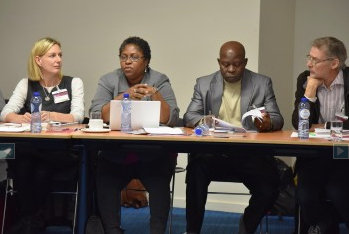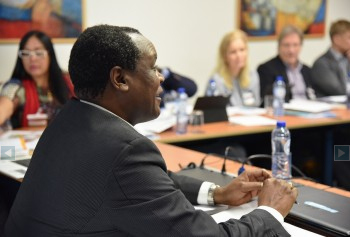Early childhood education a key priority for EI and SDGs
Education International’s working group on early childhood education has reiterated the importance of ECE in helping young children reach their full potential and the sector’s contribution to the achievement of sustainable development goals.

Thirty-four participants from across the globe attended the early childhood education (ECE) working group meeting, held from 16-17 January at Education International (EI) headquarters in Brussels, Belgium.

EI's Dennis Sinyolo addressing the ECE working group
In his opening remarks, EI Deputy General Secretary David Edwards reminded participants about the critical importance of ECE. He went on to highlight key EI priorities, including EI’s campaign for the implementation of sustainable development goals (SDGs), the EI Global Response to the privatisation and commercialisation in and of education, and the global union’s efforts to improve professional teaching standards and quality terms of employment. “ECE is, and will continue to be, at the heart of these and other EI priorities,” Edwards concluded.
SDGs need quality early childhood education
Education International’s Dennis Sinyolo echoed those views on the role of ECE within the SDGs. He reminded participants that achieving the target 2 of the SDG 4, which focuses on quality education, depends on ensuring that by 2030, all girls and boys complete free, equitable and quality primary and secondary education, leading to relevant and effective learning outcomes.
“This meeting comes at a crucial time,” Sinyolo said, “as, with less than 14 years left before 2030, we need to put pressure on governments everywhere to meet their SDGs and ECE commitments”.
ILO Policy Guidelines on ECE
The working group further stressed the need for education unions, teachers and education support personnel to familiarise themselves with the provisions of the International Labour Organisation (ILO) policy guidelines on the promotion of decent work for early childhood education personnel. It also reiterated the need to urge governments to implement these guidelines.
EI contributed to the development of the ILO policy guidelines, which set out basic principles and minimum standards for decent work in the ECE sector.
Role of ECE working group in achieving SDG 4.2
The ECE working group was appointed by the EI Executive Board, following the decision of the 2015 EI World Congress in Ottawa, Canada. It supports EI in implementing its ECE strategy, including keeping ECE high on unions’ and governments’ agendas and promoting the appropriation and implementation of SDG 4.2 and the ILO’s policy guidelines on ECE.
It also supports EI’s advocacy for the improvement of initial education, continuous professional development, and decent working conditions for ECE teachers and educators, as well as research into various aspects of ECE.
In light of the above, the working group discussed and adopted an action plan to promote ECE, the professional status, terms and working conditions of ECE teachers and educators.
Source: Education International
- 456 reads
Human Rights
Ringing FOWPAL’s Peace Bell for the World:Nobel Peace Prize Laureates’ Visions and Actions

Protecting the World’s Cultural Diversity for a Sustainable Future

The Peace Bell Resonates at the 27th Eurasian Economic Summit

Declaration of World Day of the Power of Hope Endorsed by People in 158 Nations

Puppet Show I International Friendship Day 2020

